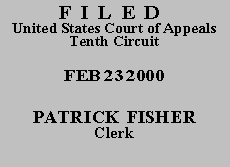

| DELBERT L. OLDHAM,
Petitioner-Appellant, |
|
| v. | |
| CARL D. WHITE, Warden,
Respondent-Appellee. |
|
Delbert Oldham seeks a certificate of appealability to appeal the district court's denial of his 28 U.S.C. § 2254 motion for habeas corpus relief. We deny a certificate of appealability and dismiss the appeal.
In 1982, Oldham pled guilty to second degree forgery and received a five- year suspended sentence. He did not file a direct appeal and his sentence was discharged in 1987. In 1992, Oldham was convicted of first degree rape and two counts of lewd molestation. He appealed his 1992 convictions, alleging various trial errors. The Oklahoma Court of Criminal Appeals affirmed Oldham's convictions and sentences.
Oldham sought state post-conviction relief as to both his 1982 and his 1992 convictions. The state court denied relief and, on appeal, the Oklahoma Court of Criminal Appeals affirmed. Oldham raised eleven allegations of error with the federal district court in a 28 U.S.C. § 2254 petition for habeas corpus relief filed on May 7, 1997. Four allegations involved trial and appellate errors in the 1982 case, and the remaining seven allegations involved trial and appellate errors in the 1992 case.
The first issue before us is whether we have jurisdiction to hear Oldham's appeal. Oldham filed an unsigned notice of appeal with the district court, which the government contends deprives this court of jurisdiction. "Every notice of appeal must be signed by the appellant's counsel or, if the appellant is proceeding pro se, by the appellant." 10th Cir. R. 3.1. However, Oldham also sent a signed notice of appeal to the Tenth Circuit Court of Appeals that was received on August 4, 1999. Under Fed. R. App. P. 4(d), a notice of appeal which is mistakenly filed in the court of appeals is treated as though filed in the district court on the date it was received in the court of appeals. The notice of appeal was received within 30 days of the July 22, 1999, order Oldham appealed. Oldham's notice of appeal was timely filed and we have jurisdiction to hear his appeal.
On appeal, Oldham raises the following issues: (1) whether he properly asserted a challenge to the 1992 sentence by attacking his 1982 sentence, which was used to enhance the 1992 sentence, (2) whether he is "in custody" for purposes of the 1982 sentence, (3) whether his 1992 sentences were improperly enhanced by an earlier unconstitutional conviction resulting from an involuntary and uninformed guilty plea, (4) whether his 1992 sentences were improper because they were enhanced by a prior unconstitutional conviction, (5) whether the 1982 court allowed him to knowingly and intelligently waive his right to counsel, (6) whether the enhanced sentencing was improperly implemented, and (7) whether the 1992 sentences are affected if the 1982 sentence is found invalid.
After our careful review of the record, we determine the analysis and conclusions set forth in the district court's order are correct and that Oldham's challenges lack merit. Oldham has failed to show he is entitled to habeas corpus relief.
Because we conclude he has failed to make "a subtantial showing of the denial of a constitutional right," 28 U.S.C. § 2253 (c)(2), Oldham's request for a certificate of appealability is DENIED and this appeal is DISMISSED. The mandate shall issue forthwith.
Entered for the Court
Mary Beck Briscoe
Circuit Judge
*.This order and judgment is not binding precedent, except under the doctrines of law of the case, res judicata, and collateral estoppel. The court generally disfavors the citation of orders and judgments; nevertheless, an order and judgment may be cited under the terms and conditions of 10th Cir. R. 36.3.